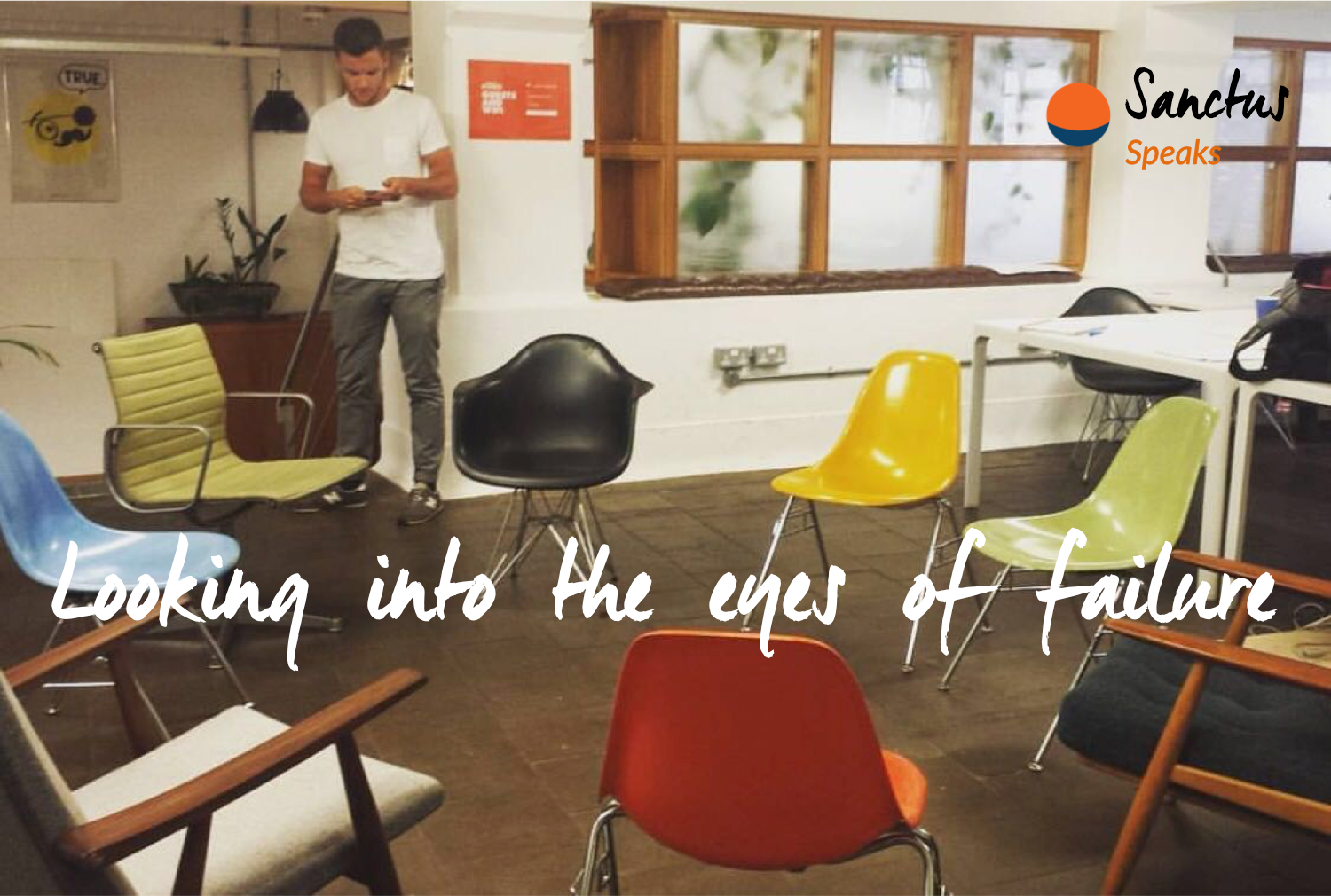Looking into the eyes of failure
? By accepting and understanding failure you can avoid being paralysed by the fear of it ?
It took nine dark months for me to deal with the failure of my first company. Personally, it could have been considered a great success — at 24 I’d raised $1m in investment, built a team and a tech product which operated at relative scale, I’d learnt an enormous amount and I had an incredible network in the UK startup ecosystem. Yet as a business, it was a failure — we’d failed to make a return on the investment we’d taken and most importantly we’d failed to build anything truly valuable to anyone.

There are many reasons why failure hurts so much. Firstly, my business was a big part of my identity — I was “James the founder of..” — so when the business failed, I failed. As a result, I suffered a huge loss of confidence, I felt hollow and lost. Now my business had gone, what’s left?
Secondly, I’d never really failed anything before. I failed my driving test the first time around, but then I passed the week later. I had a great childhood, I got straight A’s at school and then went to a good University. So when I realised I’d failed to accomplish what I’d set out to do with the business — I didn’t know what to do.
The thing that hurt the most, was that it was down to me. No matter how much I tried to blame others — our investors, our advisors, the market, the timing — it all came back down to me and the decisions that I made (along with my co-founders). Yes, we may have been in a difficult market, but I chose that market. Yes, our investors didn’t add much value, but I knew that and still took their money. Yes, the people we had around us weren’t A-players, but we knew that and carried on.
? It was the fear of failing (or admitting failure) that lead us to fail, because we were afraid to fail, we failed ?
At the time, deep down — we knew that most of those aforementioned things were wrong. For example, we knew that the money we raised wasn’t the right money for us. Still, we closed our eyes and held out our hands because we were afraid of what would happen if we didn’t. I was scared of the truth, of the decisions we’d have to make if we faced them.
Fear paralysed us and left us stagnant. We were scared of admitting we were failing, that we’d made the wrong decisions or even that we had no clue what on earth we were doing. In hindsight, I was weak and ignorant. The fear of failure had me trapped, half down to pride — I was scared of what others might think, and half due to uncertainty — I was scared of what might happen next.
The inertia for me was to fight through the fear, to continue to push and to persevere. Blind faith pushed those fears to the side in the blinkered view that we could “do it”, that we could “work it out”.
You can only push for so long until your fire burns out and those truths you locked away come bubbling up to the surface. Eventually we failed.
9 months on and I’ve re-entered the realm of entrepreneurship working on something that I deeply care about. However, in the week preceding the launch of the first Sanctus Session I was struck with that same fear. More attuned to it this time I could sense it in the form of anxiety and panic.

Luckily, I could take this challenge into the first session and openly talk about it. It was liberating to be able to confess a vulnerability like this and feel a kindred spirit from other people who felt exactly the same.
“If you can introduce your name, what interested you in this session and give a quick introduction of a challenge you’re facing currently.”
I vocalised my fear of failure to the group and shared how I didn’t want to make the same mistakes again with my new venture:
“Hi Everyone, I’m James. You know why I’m interested in this session, I organised it.”
*Laughs*
“I suppose my biggest challenge right now is that I have a fear of failure, I’m scared of failing again and making the same mistakes. Of wasting my time, other peoples time and other people’s money.”
The session that entailed wasn’t just about me, but during it I picked up some insights that have fundamentally changed my mindset on failure and reaffirmed what I already knew.
Defining Failure
During the paired work (sparring), my partner listened to me ramble about failure, until he asked me to define it. I stopped for a moment, because nobody had ever really asked me that and I’d never really took a second to consider it. I explained that I’d consider Sanctus a failure if nobody even cared and nobody turned up.
Defining failure helped to make it something that I could measure against and it became something I could work towards. Rather than just a big scary black void, failure was now something much more tangible to me. Plus as it turns out, people already cared and people had already turned up — so by my definition I’d had an early success!
What does failure mean to you? Define it.
Always Failure
As we returned to the group and shared our reflections I was proud to announce my new found relationship with failure. Another attendee turned to me and quite bluntly explained that there was nothing in life, no matter how big or small, that you could do without encountering the fear of failure or rejection.
Viewing failure as something which is ever-present really helped me to de-mystify it and almost devalue it a little too. Viewing failure as a constant made it much less surprising and much less frightening.
Failure will always be there.
Caring about Failure
As I talked more and more, I also started to reflect. I reminded myself how much I cared about what other people think. I cared that I might negatively affect other people and what they would think of me if I failed.
I’d had the realisation six months earlier. Nobody cares if I fail, or at least, nobody cares as much as I do. There are very few people that genuinely care if you fail. The people that do care are probably the ones that you care about and the ones that don’t, you don’t care what they think anyway.
When I first realised this It was like a lightbulb moment. I was shocked at how obsessed I had become with failure. It’s impossible to tell someone to stop caring, but if you care what other people think or what their perception of you might be if you fail. Let it go, they don’t care as much as you do.
Only you care about your failure.
Regretting Failure
Reflecting more and more, I remembered the biggest learning I had on failure; is that you should never regret it. I regret some of my failures in my first business and I don’t want to feel like that again.
The real key to embracing failure is to work on something that you love so much, that you don’t care if you fail — you’ll have enjoyed every second of it anyway.
Never regret failing.
So if you are scared of failure, I believe you are destined to fail. That innate fear is not a sustainable driving force, it will lead to a paralysis followed by inaction and ultimately a bitter end.
However, it’s not all doom and gloom. If you work to understand what failure means to you and to accept it, you can redefine it. That way — you can’t fail.

